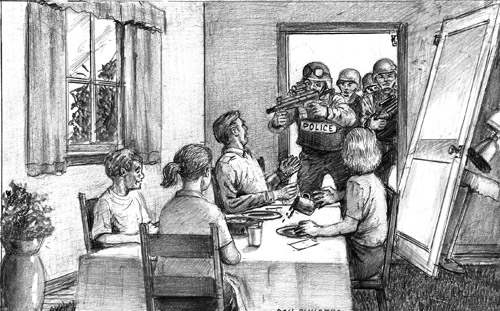 |
|
| Issue #146 • March/April, 2014 |
He’s back our poker-playing friend from Southern California, O.E. MacDougal. He came up here to fish. I thought he was after salmon, but this time he came for the surf perch. He bought one of those (expensive) out-of-state fishing licenses and now he’s whiling away his days on the gravel spit that stretches most of the way across the mouth of the Rogue River, between Gold Beach and Wedderburn, Oregon. He cooked up a mess of them here at the office. For those who complain about fishy or oily fish, surf perch are neither. (Mac, Dave, and I happen to like all kinds of fish.)
“Any complaints about the current social or political climate?” Dave asked him as we ate.
Mac didn’t answer for a moment and I thought he had nothing to say. But, suddenly, he said, “The militarization of our police forces … and the proliferation of SWAT teams in particular.”
“What do you mean?” Dave asked.
Mac shrugged. “We’re in an era of falling crime rates but we have more cops than ever and we’re arming them with weapons that are actually meant for the battlefield, not for policing American citizens.”
After a pause he added, “Did you know that early Americans opposed police forces? They viewed them as a ‘standing army,’ an idea they dreaded because they felt that, eventually, that army would be used against them. Now, with the militarization of our police forces, we’re creating a standing army whose duty it is to enforce laws, even the most minor of laws, using military-grade weaponry, and Americans don’t seem to care anymore. My take on it is that this is a dangerous trend.”
I was still stuck on the idea that there was a time when Americans didn’t want police forces. “What’s the problem?” I asked. “We need the police to protect us.”
Mac didn’t seem to be impressed with my comment.
“That’s why they have ‘To protect and to serve’ on the sides of their cars,” I added.
Mac said, “It doesn’t matter what the slogans on their cars say. What matters is what’s in their charters, and no police charter in this country or probably any other country obligates the police to protect or to serve you. It doesn’t even matter if the Chief of Police promises to protect you, neither he nor his department will be held legally responsible if he fails to.” After another pause he added, “The only time the police have to protect you is when you’re in their custody.”
“I don’t believe that,” I said.
“Don’t believe what?”
“What you said about ‘to protect and to serve.'”
“Well, how about this: For decades, people have brought suits against police departments because the police didn’t protect them, in some cases even after having promised to protect them. But the citizens have almost never won those suits and the few victories they achieved have always been overturned on appeal in favor of the police. Finally, in 2005, in the case of Castle Rock v. Gonzales, the Supreme Court ruled, once and for all, that law enforcement in the United States is not obligated to protect or serve you.”
As I was googling Castle Rock v. Gonzales on my phone to see if it was true and it is, Dave said to Mac, “Let’s get back to SWAT teams. What is it about them that bothers you?”
“Fifty years ago, there were no Special Weapons and Tactics teams, the so-called SWAT teams. Today, there are thousands of them. This is despite the fact that violent crime is at its lowest point in four decades.
“There was a time, back in the ’70s, when there were probably 150 SWAT team raids a year, nationwide. Today, there are about 150 a day, 365 days a year. And the number of raids is increasing every year. For those who like big numbers, we’ve seen more than a 36,000 percent increase in 40 years.”
“We haven’t always had SWAT teams?” I asked.
“No,” Mac said.
“How did they come about?” Dave asked.
“Originally, they were sold to the public as a strategy for dealing with high-risk situations that might put law enforcement and the public at risk, things like hostage situations, snipers, and the gang tactics such as were used by rioters during the Watts Riots in Los Angeles in 1965. And they were supposed to be available for what we’re now calling terrorist threats.”
“There’s nothing wrong with that,” I said.
“There wouldn’t be if that’s what SWAT teams had stayed limited to. But like the Racketeer Influenced and Corrupt Organizations Act (RICO Act) which allows seizure of private property and which we were told was only going to be used against drug kingpins, but now is used to seize private property, even in the case of petty crimes the original intent of SWAT teams has now been blurred and, more and more, they’re used to perform everyday police work. They’re used to serve search warrants that, just a few decades ago, were done by … well, the kinds of cops you have here in Curry County, Oregon.
“Cops used to knock on your door, announce who they were, present the warrant, then conduct a search or make an arrest. Nowadays, SWAT teams are executing what are known as ‘no-knock’ warrants. That is, they don’t knock and announce themselves, and the first time you know they’re there is when they’re busting down your door or blowing it off its hinges with explosive charges and, often, it’s after they’ve thrown concussion and flash grenades through your windows to disorient you. And they charge in wearing flak jackets and masks and carrying M16 rifles. All too often this happens just before dawn when you’re asleep and you’re going to be disoriented anyway.”
“That sounds like a recipe for disaster,” Dave said.
“You’ll see it is,” Mac promised and continued. “They then ransack the premises, often causing thousands of dollars in damage for which they don’t feel responsible and for which you may never be compensated, even if they find nothing or, worse, if they have the wrong address and that happens more often than you think.”
Before either of us could interrupt, he said, “And maybe we could excuse it if they were only used in pursuit of dangerous criminals. But more often they’re being used for mundane police work: enforcing misdemeanor-type laws like selling unpasteurized milk, closing unlicensed barbershops, or taking motherless fawns away from animal shelters. A SWAT team raid was even staged to enforce music copyright law.”
“That’s crazy,” Dave said.
Mac nodded in agreement.
“How did it all change from fighting serious crime to fighting a ‘war on misdemeanors’?” Dave asked and made me and Mac laugh.
“It’s a long story.”
“Tell it,” Dave said. “John and I have got the time.”
“Okay. Before 1980 only a few cities had SWAT teams, among them Philadelphia and Los Angeles. But the real beginning of the militarization of police forces began in the early ’80s when we began arming law enforcement with battlefield-grade weapons. The excuse given for this was that we were fighting the ‘War on Drugs’ because drugs were supposed to be a threat to national security.
“As with every other draconian measure our governing bodies have imposed on us, at first we were assured that the introduction of the SWAT concept had noble purposes, and that there’d be enough civilian oversight to ensure it wouldn’t be abused. But, almost immediately, abuses began to emerge, and when they did, our elected officials turned a blind eye to them, and the media ignored them. But worst of all is that the voting public was gulled into accepting these changes in police tactics, along with the incumbent abridgements of our rights, because we were led to believe that, somehow, these abuses and infringements on our rights were going to make us safer. But, of course, the biggest reason they were ignored was because the teams were used primarily in predominantly black or Hispanic neighborhoods, and middle-class Americans didn’t see them.
Military equipment
“We also ignored the fact that, nationwide, since the ’80s, law enforcement agencies that wanted SWAT teams began stocking up on those military-grade weapons and equipment. They’re now getting tens of billions of dollars of surplus military equipment, either free or at steeply discounted prices, from the federal government, stuff you’d expect to only find in a war zone. They’re getting M16s, armored personnel carriers, grenade launchers and bayonets, helicopters … ”
Dave interrupted: “Grenade launchers! Bayonets! What the hell do cops need those for?”
Mac continued: “And this stuff isn’t necessarily going to urban areas where most middle class Americans might have expected them to be deployed in anticipation of the next major riots. Much of it goes to suburban and even rural police forces where crime is practically nonexistent.”
“And while it may seem comforting for most Americans to know that the police forces have all this stuff in case there is a major riot or al Qaeda storms our shores, the fact is, while we’re waiting for the riots and jihads, they’re being used against us.”
“But the War on Terror is a big threat today,” I said.
“There are so few terrorists and terrorist threats in this country that the police, particularly the FBI, have taken to entrapping crazy people to keep the so-called threat alive. Look at the history of most of the terrorist plots they break up. A common theme running through them is law enforcement. For example, the FBI finds some young guys, often young minority men, who have nothing to do and time on their hands. They ‘infiltrate’ the group with one or more operatives who whip these guys up to do something they hadn’t thought of on their own and would not have been able to carry out without some law enforcement agency prodding them and providing them with supplies. Then, at the last minute, they bust the guys for something that was never going to happen and toot their own horns for ‘stopping’ them.”
“What about 9/11 and the Boston Marathon bombers?” I asked.
“Somehow, those two events seem to be evidence that they can’t stop real terrorists, they can only stop the ones they create.”
While I was thinking about that, Dave asked, “Have you got an example of law enforcement creating terrorists?”
“One of the most famous cases was the ‘Liberty City Seven.’ They were a bunch of black guys in Liberty City, Florida, near Miami, who formed a religious group which was an odd mixture of Christianity and Judaism, with a sprinkling of Islam thrown in. I don’t know what they were doing before they were approached by a couple of street hoodlums, who were actually paid FBI informants. The two hoods posed as al Qaeda agents and infiltrated the group, put it in the members’ minds that they would get money to support their religious mission, but they had to help in some al Qaeda jihad plot.”
“What was the plot?” I asked.
“To blow up the Sears Tower in Chicago.”
“So, they didn’t go to al Qaeda for money,” Dave asked.
“No. They didn’t even go to al Qaeda for the idea of blowing something up. The FBI brought it to them, enticed them with money, and when these ‘terrorists’ gave the FBI shopping lists of what they needed to carry out their mission, what was on the lists were requests for military uniforms, military boots, a digital camera, the rental of a van, and some other paraphernalia. Conspicuously missing from their lists were explosives or any weapons to make them dangerous.
“Anyway, the FBI finally ‘busted’ them and the so-called Liberty City Seven were brought to trial on terrorist charges.”
“How’d it go in court,” I asked.
“The government’s story was so weak that, even after voir dire that’s the process in which the two sides can more or less cherry pick the jurors they needed three trials to get convictions because there were jurors who, justly so, remained unconvinced that there was ever a real threat and that this wasn’t out-and-out entrapment.
“Oh! And I should mention that only five of the seven were convicted of anything.”
Dave leaned back in his chair and asked, “This isn’t a joke, is it?”
“It should be. But there are more examples like this in which there never would have been a terrorist threat unless the government put it in the minds of gullible young men and then prodded and financed the operation until they had enough evidence to yell, ‘We caught them!'”
“If the government had never approached them … ” Dave began.
Mac finished Dave’s sentence. “…they’d just have been walking around the streets of Liberty City beating their bibles or whatever it is they’d been doing.
“By the way,” he continued, “if we’re going to talk about the militarization of our police forces, I should mention that there are two books about it, both by a guy named Radley Balko: Overkill: The Rise of Paramilitary Police Raids in America and Rise of the Warrior Cop: The Militarization of America’s Police Forces. I’ve read the first one; eventually, I’ll get to the other. Some of the best examples and reasons of why militarization of our police forces is a bad idea can be found in his books.”
“If there’s so much less violent crime and terrorism, how do they justify all the military gear?” Dave asked.
“Many in law enforcement claim they need military grade weapons saying ‘It’s a war zone out there.’ But facts belie their argument. Like I say, the rate of violent crime is dropping. It’s about half of what it was 20 years ago and this includes murder, robbery, forcible rape, and other violent crimes. In fact, the violent crime rate is the lowest it’s been in 40 years.”
“Maybe SWAT teams are the reason it’s dropping,” I said.
“No one’s saying that. For one thing, it’s rarely violent criminals the SWAT units go after; they’re usually executing search warrants on small-time drug offenders. There are probably a half-dozen theories about the decline in crime but in a report from the Cato Institute it was pointed out that when New Haven, Connecticut’s now-retired police chief reined in that city’s use of SWAT teams, back in the ’90s, the city’s crime rate fell more than it did in other cities. So, it would seem that the proliferation of SWAT teams has nothing to do with reducing crime.
“On the other hand, despite the growth in the number of SWAT team raids, which are almost all drug oriented, according to the Huffington Post, drug usage is now at a 40-year high.
Killing the innocent
“Another argument law enforcement has given for military-grade weapons and tactics in these raids is that they reduce the chances of violence. The problem with that explanation is that those tactics aren’t just used to raid crack houses, they’re also used in raids on medical marijuana dispensaries, doctors’ offices, and even high schools where there’s almost no chance of violence unless the police precipitate it themselves. Furthermore, because they’re frequently used to raid homes of minor drug offenders, with grenades going off and the front door being broken down by men who rush in screaming and swearing, the natural first reaction of many gun owners is to grab a gun and shoot. Some do and someone gets killed. Sometimes it’s one of the residents, sometimes it’s one of the cops. What’s worse is when the raiders have the wrong address. They enter like it’s a home invasion by hoodlums and sometimes kill someone who’s innocent, who’s just trying to protect his or her home from unknown intruders.
“It’s been noted, by the way, that when these ninja-clad warriors have mistakenly invaded a house where a cop or former cop lives, the first instinct of the cop residing there is to … ”
“Grab a gun, just like the rest of us gun owners,” Dave said, finishing Mac’s sentence.
I interrupted. “But doesn’t it make sense that people should check, first, to make sure it’s cops and not criminals breaking into their houses?”
“Balko points out that in New York City alone, more than 1,000 times a year home invaders identify themselves as law enforcement when they come crashing into homes. And there’s at least one case of a woman talking with a police dispatcher, begging for help because gang members were trying to break in. Then she said, ‘Wait, they just said they’re the FBI.’ So she let the imposters in. She’s dead, now. Waiting to find out if it’s criminals or aggressive cops coming through your door can get you or your family members killed.”
“And, apparently, not waiting can, too,” Dave said.
Mac continued, “Here’s another thought: You’d think that if you’re a law abiding citizen who has virtually no reason to expect the cops to be breaking down your door, you have every right to defend your home, your life, and your loved ones. But these SWAT teams are killing people for acting on that instinct, an instinct they themselves would act on. If it turns out to be hoodlums acting like cops, and you shoot back, you’ll get a pat on the back, but if it’s cops acting like hoodlums and you shoot back, it’s a crime. Citizens who think they’re defending themselves because they don’t know it’s the police have been prosecuted on charges ranging from criminal recklessness to murder, and they’ve received sentences ranging from probation to the death penalty … even when the police have bungled and they’ve come to the wrong address.”
“Are those who screwed up on the police side of things ever held accountable?” Dave asked.
“In a logical world, they would be. But even if they kill you, they’ll almost never take responsibility.”
Economics of raids
“You say they’re not going after murderers, child molesters, and robbers on these raids. So why are they going after so many petty criminals this way?” Dave asked.
“Economics.”
“Economics?” I asked incredulously.
“It’s part of the story, John. Though a lot of the municipalities and agencies got the military equipment for very little or nothing, once it’s in their hands, the costs start piling up because it’s expensive to train cops to use it and a lot of it is expensive to maintain.”
“So, I’m going to guess,” Dave said, “that a contributing factor to the increased use of SWAT teams is because there’s a sense of ‘use it or lose it.'”
“Bingo! If all that stuff is just sitting there, piling up bills and gathering dust because there are no hostage situations, no roving gangs of jihadists, and no drug-crazed gangs barricading themselves in bunkers, then what’s your excuse for keeping it, even if you got it for free?
“So, to justify having it, they start sending them out every time they want to serve a warrant, and they send them out for more and more things that you wouldn’t think they’d be needed for.”
“Are you just anti-cop?” I suddenly asked Mac.
“No. There are a lot of cops I like and a great many cops still believe they’re here ‘to protect and to serve,’ even though they’re aware they’re not obligated to. You’ve got good cops here in Curry County. A few days ago, when I got into town, I’d gone across the street to the supermarket, and when I came out, there was some guy across the street, leaving the Dairy Queen parking lot. As he was leaving he was screaming at two town cops. I just arrived as he was crossing Sixth Street. The way he was yelling at the cops, I was expecting a Rodney King-type of beat down of this jerk. But the two cops stood there, weathered his tirade, and let him move on. I suddenly realized they understood the guy had a problem and it wasn’t one they could have solved. As long as he wasn’t an actual threat to anyone, they’d let him go. But it was obvious they didn’t take his tirade personally. Those are the kind of people who should be cops.”
“Well, it’s nice to live with good cops,” I said.
“Let’s continue with the economics of why they are using SWAT teams, especially to go after small-time druggies,” Dave said to Mac.
“Sure. Another economic reason they go after drugs is that there are federal bounties on drug arrests that are part of the so-called War on Drugs. The politicians are so focused on drugs, police departments get a certain amount of funding for every drug arrest, and many get state funds, also. So, it’s to their benefit to go after drugs. On the other hand, there’s no financial incentive for arresting child molesters, wife beaters, murderers, terrorists, or bank robbers. That’s why jails and prisons are filled with drug offenders.
“Mix into this “asset forfeiture,” which is legal under the RICO Act. That’s where the police can seize whatever they find in a drug raid, sell it, and keep the money for their budgets. They can do this even if the person from whom they grab them is never convicted of a crime. The only criteria they need is that you be a ‘suspect.’ What we have is an incentive to stage these commando-style raids, even on mere suspicion, or even false information from some ‘informant’ who feels compelled to provide information because he or she is either getting paid or trading the information for leniency for turning someone in. These informants have been known to either plant evidence, in the form of drugs, on the people they’re turning in, or they help the police entrap them. And what’s worse, according to Balko, is that even when these informants turn out to be unreliable, prompting SWAT teams to raid the homes of innocent people, some jurisdictions have no qualms about using the same informants again.”
Entrapping the nonviolent
That was followed by a silence, until Dave said, “Let’s get back to entrapment. Do the cops only use it for violent crimes?”
“No, they’ve also created many nonviolent crimes, some of which turned violent and they wound up killing whoever they were entrapping.”
“Give us an example of something like that,” Dave said.
“Balko writes about the killing of an unarmed Virginia optometrist who had been entrapped into betting ‘too much.’ The cop who started it, Fairfax County detective David Baucum, overheard a 38-year-old optometrist, Sal Culosi, making sports bets with his friends at a local bar. Baucum apparently couldn’t find enough serious crime to pursue, so he decided to create some victimless crimes. To make a long story short, he befriended Culosi, then spent the next several months … months,” he emphasized, ” … getting Culosi to raise the stakes on the bets until they exceeded the limit allowed under a Commonwealth of Virginia law, a law the optometrist was unaware of. Then, Baucum called Culosi telling him he was going to come out to his house to give him the payoff. But he showed up with a SWAT team and … ”
“Wait a minute,” Dave interrupted, “they showed up with … what’d they need a SWAT team for?”
“Let me finish,” Mac said. “Culosi came out of his house, unarmed, barefoot, wearing a T-shirt and jeans, had no criminal history, and no history of violence, and one of the cops, Detective Deval Bullock, ‘accidentally’ killed Culosi. Bullock said the gun went off in his hands when the door to his police vehicle allegedly hit his arm. For that, you or I would go to prison, accident or not. But Bullock’s total punishment was that he was suspended for three weeks without pay.”
“What did his fellow officers think of that kind of slap on the wrist?” I asked.
“That it was excessively harsh.”
“Are you kidding?” I asked, and I waited for Mac to say he was, but he shook his head no.
SWAT team used to rescue a fawn
Mac smiled. “Would you believe they have used SWAT teams for things like recovering a motherless fawn from an animal shelter?”
“You said that, but I thought then you were kidding,” I said.
“Just this last summer in Wisconsin, the Department of Natural Resources was informed that a no-kill animal shelter had taken in an abandoned fawn … maybe a fawn whose mother was hit by a car. They scouted the place, even using aerial surveillance, then stormed the shelter with 13 armed officers to get the deer.”
“They couldn’t just send a cop out and knock on the door or have made a call asking them to turn over the fawn?” I asked. “They needed a SWAT team?”
“When asked why they didn’t do just that, a police spokesman rationalized the raid, by more or less saying, ‘We don’t knock on the door and ask drug dealers to turn over their drugs, so why should we knock on the door and ask for the deer?’ I’m paraphrasing that, of course, but that response is symptomatic of the mentality and attitude too many police agencies use to justify the use of their SWAT teams.”
“So, what did they do with the motherless fawn?” I asked. “Let it go even though it didn’t have its mother to look after it anymore?”
“They euthanized it.”
“That’s got to be a joke?” I said.
Mac wryly smiled. “No.
“SWAT teams are also being used for code enforcement,” he said.
Confused, I asked, “Code enforcement?”
“You know, zoning laws, etc. Just this past summer, in Arlington, Texas, a SWAT team was deployed, ostensibly to look for marijuana being grown illegally, and they found none however, according to the Huffington Post, what the cops came armed with was an inspection notice for nuisance abatement.
“SWAT teams accompanying code enforcement people is happening right now in Antelope Valley, which is in L.A. County. They’re showing up decked out in all their paramilitary gear, citing people who have lived there for years, sometimes for decades, for supposed code violations, and ordering them to tear everything down and forcing them to move off their land.
“In some jurisdictions, SWAT units have been sent to respond to barking dogs. Also in L.A., they’ve been sent out to enforce licensing laws. For example, one black woman was doing hair dressing without a license. She was happy, her customers were happy, but she didn’t have a city or state-mandated license, so a SWAT team stormed her shop wearing paramilitary gear. They handcuffed customers and arrested her … ”
Dave laughed, looked at me, and said, “You’re going to write about this!”
Mac was on a roll. “Do you remember the Cuban kid, Elian Gonzales, whom the Clinton Administration wanted to send back to Cuba? They sent 150 SWAT team members to grab him from his family.”
“A 150-member SWAT team?” I asked incredulously.
“Google the kid’s name. See the fully armed and fully armored SWAT guy going for the six-and-a-half-year-old kid.”
“I remember that being in the news,” Dave said.
“Some of these SWAT teams have done things that were unbelievable, and I’ll cite one for you.
“Balko, in one of his books, describes an Arizona raid in which the police accidentally burned down a house they were raiding and one of the officers, using a fire extinguisher, literally drove the dog that belonged to the owners back into the house so that the animal burned to death and, in the end, since they couldn’t find anything they were looking for, they arrested one of the residents on outstanding traffic violations.”
“That’d be funny if it wasn’t horrifying,” Dave said.
“I know,” Mac said.
“But what about the damaged property and people who get killed or injured?” I asked. “What kind of compensation is there for the victims?”
“The police usually refuse to pay for damaged property or ‘accidental’ deaths … unless there’s a media outcry or the plaintiffs win a civil suit. Then it’s, ‘Okay, we’ll pay,’ but even then the payments don’t come out of the individual cops or their departments’ budgets … ”
“The payments come out of the taxpayers,” Dave said.
“Right.”
Federal SWAT teams
“Do the Feds have SWAT teams?” I asked.
“The federal government’s are among the most offensive. Until recently, in some states where medical marijuana had been made legal, the federal government still abided by the idea that it shouldn’t be, and their paramilitary SWAT teams arrested doctors, treatment center employees, and patients who have no criminal records and no history of violence. They did this after crashing through the doors with fully-automatic weapons and handcuffing patients.
“Even doctors who have been simply suspected of overprescribing painkillers have had their offices raided by gun-wielding federal SWAT teams. And, again, rather than using the door handles, they kick the doors down. Worse, the bedridden, the elderly, and the handicapped are often handcuffed. I may be wrong, and I’ve been in plenty of doctors’ offices, but what is it these cops are scared of? That the doctor may say, ‘Turn your head and cough.’?”
I laughed; Dave smiled.
“Most people are unaware of this, but some 40 federal agencies now have their own armed police forces, including the Environmental Protection Agency. A few weeks ago, armed personnel from the EPA showed up in Chicken, Alaska, population seven, wearing full body armor, looking for possible violations to the Clean Water Act. What were they afraid of? Someone handing them a glass of water and insisting, ‘Drink this!'”
“There’s got to be some reaction by good cops,” I said. “What do they say when they see the crazy things you’re talking about?”
“Almost all the ‘good’ cops who see their fellow cops engaging in this behavior keep their mouths shut. If they don’t, they’re ostracized. Perhaps in a town like this they wouldn’t be.
“But what’s ironic about them keeping their mouths shut when they see abuses, some of which are illegal and outside the sphere of their protective immunity, is that if private citizens are with someone who breaks a law, and we say nothing, we can be charged with being an accessory or with aiding and abetting, and the police have no problem arresting us. But if a cop is in the company of another cop and sees him or her breaking the law and says nothing, they’re almost never held accountable.”
Solutions
“What’s the solution? How do we get back to where we used to be?” Dave asked.
“First,” Mac said, “call off the War on Drugs. It’s really the ‘War on the American People,’ and it’s the biggest reason for the proliferation of militarized police forces.”
“We’ve written articles about ending the War on Drugs before,” Dave said.
“Second is to hold grown men and women who screw up accountable for their actions. Hermann Goering, the second most powerful man in Nazi Germany and the founder of the Gestapo, told his men ‘Shoot first and inquire afterwards, and if you make mistakes, I will protect you.’ This is what American courts and politicians are now telling America’s paramilitary police forces. We should be doing exactly the opposite. We must start prosecuting reckless cops the same way we prosecute reckless drivers and reckless gun owners. And, if not that, they should at least be fired and barred from law enforcement for the rest of their lives. Now, when there’s a raid on the home of someone who’s innocent and this innocent has his or her property destroyed, or he or she is injured or killed, the police, the courts, and the politicians treat it as an unfortunate by-product of the War on Drugs. But if one of those innocents injures or kills one of the cops because they really don’t know if it’s cops who are busting down their door, it’s not an unfortunate by-product of the War on Drugs, but a crime.
“Third is obvious: Stop giving law enforcement military grade weapons of war to conduct police work with civilians.
“Fourth is to recognize that the Constitution and the Bill of Rights were not put in place to make government more efficient, but to protect us from the exact abuses the American people are being subjected to, right now.
“Fifth, stop the economic incentives Washington has created to wage war on us. End the federal bounties for drug arrests.
“Sixth, local police departments should not be allowed to finagle their way around restrictions put in place by the state legislatures or local municipalities, restrictions that are intended to rein in SWAT team abuses.”
“How do they do that?” Dave asked.
“They call in one or two federal agents, such as from the DEA, and turn it into a federal investigation, and supposedly, the local SWAT team is just ‘going along.'”
“Then, I suppose, they’re not bound by the local or state restrictions,” Dave said.
“That’s right. And the feds are probably the worst at trampling on your rights and the most dangerous in dealing with the public. Either they should not be able to call the feds, or the feds should have to comply with local restrictions on use of force, thereby making their presence moot.”
“And you think these steps would stop SWAT team abuses?” I asked.
“Completely? No. But it would ensure that the civilian oversight SWAT teams apparently need would be in place.”
Further, in his book, Radley Balko says all SWAT raids should be videoed. I think they should be, too, and that the public should have access to them. It would not only make the cops behave better, it would also make the public aware of how often SWAT teams are needlessly used to enforce misdemeanor crimes. And I believe it was Balko who said we should establish hotlines for complaints about no-knock raids. When it’s been done, it’s turned up more botched raids than the police are willing to admit to.”
“What do you think the authorities will do to correct the problem?” Dave asked.
“Little or nothing,” Mac replied. “There have been thousands of botched raids. Innocent people have been terrorized, injured, and killed. Once in a while there’s some public outrage and the media might focus on it for a short time while the courts, politicians, and bureaucrats promise or even attempt to institute reforms. But the police unions and DAs will resist, and eventually the hubbub dies down and nothing’s done.”
“Politicians and citizens have tried to set up review boards to monitor and keep in check police abuse, particularly with these SWAT teams, but the police resist providing those review boards with complete and accurate information, so the boards wind up backing police claims that the use of force, often deadly force, was justified. However, in hundreds of cases around the country, where suits have been brought against the police and all the evidence has been uncovered and presented to juries, those juries have found in favor of the plaintiffs. In other words, the evidence showed police culpability, negligence, and even murder. Monetary awards are made to the victims or the victims’ estates, all of which is paid by the taxpayer and not the police or their budgets, and, usually, nothing happens to the officers involved.
“So there’s very little in the way of oversight and control and not only are the problems not resolved, but with no incentive to improve how they conduct these raids, they seem to be getting worse.
“The police see nothing wrong with what they’re doing, and often the city, county, state, or federal officials don’t, either. But, let it get to a jury trial and, often, juries see through the lies, hypocrisy, cover-ups, and incompetence, and award large sums to the victims.
“Many SWAT teams have lost the respect of the civilian authorities who are supposed to be supervising them.
“Some jurisdictions have had the common sense to dissolve their SWAT teams after realizing that they were making too many botched paramilitary raids on innocent citizens or that the raids they were conducting were better done doing good old-fashioned police work.”
“There are cops, courts, legislatures, and whatnot involved here. Who do you blame?” I asked.
“The American people,” he said without hesitation, “because we don’t speak out against bad laws. Ultimately, the American people are supposed to be governing this country. We don’t. But that doesn’t make us any less culpable.
“But one of the good things that may help put the SWAT teams in check is that, today, almost everyone has a video camera in their phone, and we have the Internet where those videos can go viral. Out of control cops don’t like that, but there isn’t an awful lot they can do about it.
“Another good thing is that people who have been abused by these SWAT teams, or the families of those who have been mistakenly killed by them, are bringing civil suits against them. And when these suits are heard by jurors everyday Americans they’re often winning. Of course the civil penalties aren’t paid by the cops themselves, nor do they come out of the law enforcement budgets.”
“They’re paid by the taxpayers,” Dave said.
“Yes, and many taxpayers and the officials they elect are getting tired of it.”
I looked at Dave and asked, “Is there a SWAT team here in Curry County?”
“No,” he said. “There was one in Brookings,” the town 30 miles south of us, “but it was disbanded.”
“That means,” Mac said, “that law enforcement here does ‘actual police work.’ And another thing in your favor is the big differences between cops here in Curry County and those in large cities: Your law enforcement lives in the communities they serve. They know the people. In large cities, they often live outside the communities they serve and don’t know many of the people. Couple that with the military attitude many SWAT teams adopt and it’s a recipe for callous abuse. Consider yourselves lucky you live with your local cops.”














